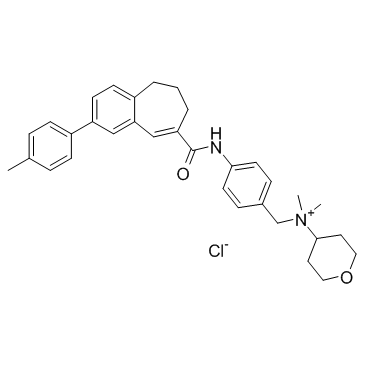Blockade of Th1 chemokine receptors ameliorates pulmonary granulomatosis in mice.
J Kishi, Y Nishioka, T Kuwahara, S Kakiuchi, M Azuma, Y Aono, H Makino, K Kinoshita, M Kishi, R Batmunkh, H Uehara, K Izumi, S Sone
文献索引:Eur. Respir. J. 38(2) , 415-24, (2011)
全文:HTML全文
摘要
Sarcoidosis is a granulomatous disease of unknown aetiology. We identified immunological targets for the treatment of pulmonary granulomatosis using a murine model generated with Propionibacterium acnes. Sensitisation and challenge using heat-killed P. acnes and dendritic cells (DCs) were performed to produce pulmonary granulomatosis in C57BL/6 mice. Immunological analyses using ELISA as well as cDNA microarray analysis were used to search for cytokines or chemokines associated with the formation of granulomas in the lungs. Co-administration of P. acnes and DCs reproducibly induced the formation of pulmonary granulomas, which resembled sarcoid granulomas. The cDNA microarray assay demonstrated that the gene expression of CXCL9 and CXCL10, ligands for CXCR3, and of CCL4, a ligand for CCR5, was strongly upregulated during granulomatosis. ELISA confirmed that levels of CXCL9 and CXCL10 as well as T-helper (Th)1 cytokines and chemokines including tumour necrosis factor-α and interferon-γ were elevated in bronchoalveolar lavage fluid (BALF). The blockade of Th1 chemokine receptors using TAK-779, a dual blocker for CXCR3 and CCR5, led to reduced numbers of CXCR3+CD4+ and CCR5+CD4+ T-cells in BALF. Furthermore, administration of TAK-779 ameliorated the granulomatosis. The targeted inhibition of Th1 chemokines might be useful for inhibiting Th1-biased granulomatous diseases, including sarcoidosis.
相关化合物
| 结构式 | 名称/CAS号 | 分子式 | 全部文献 |
|---|---|---|---|
 |
TAK-779
CAS:229005-80-5 |
C33H39ClN2O2 |
|
Effects of a calcineurin inhibitor, FK506, and a CCR5/CXCR3 ...
2011-07-01 [Transpl. Immunol. 25(1) , 49-55, (2011)] |
|
Evolution of CCR5 antagonist resistance in an HIV-1 subtype ...
2010-12-01 [J. Acquir. Immune Defic. Syndr. 55(4) , 420-7, (2010)] |
|
Synthesis of [19, 35, 36-(13)C(3)]-labeled TAK779 as a molec...
2009-08-15 [Bioorg. Med. Chem. 17(16) , 5769-74, (2009)] |
|
HIV-1 clinical isolates resistant to CCR5 antagonists exhibi...
2012-01-01 [J. Virol. 86(2) , 1119-28, (2012)] |
|
C-C chemokine receptor type 5 (CCR5) utilization of transmit...
2010-12-01 [J. Gen. Virol. 91(Pt 12) , 2965-73, (2010)] |